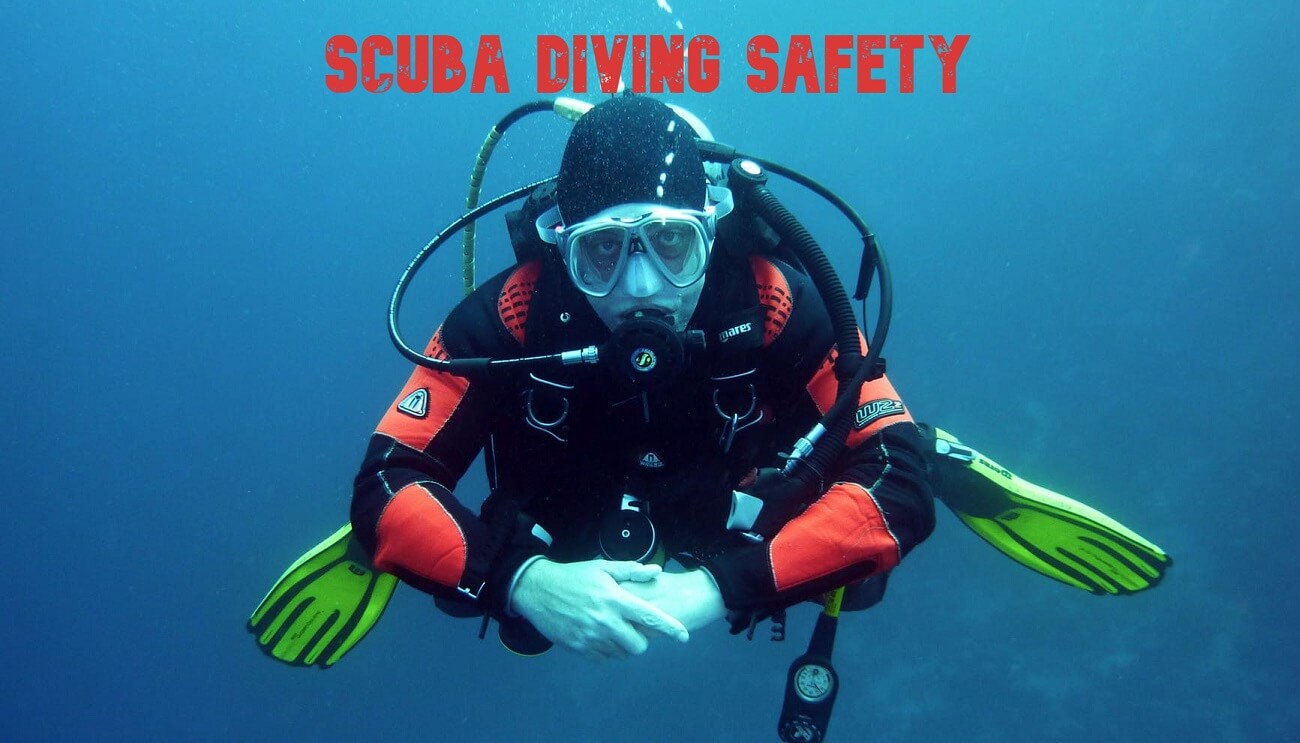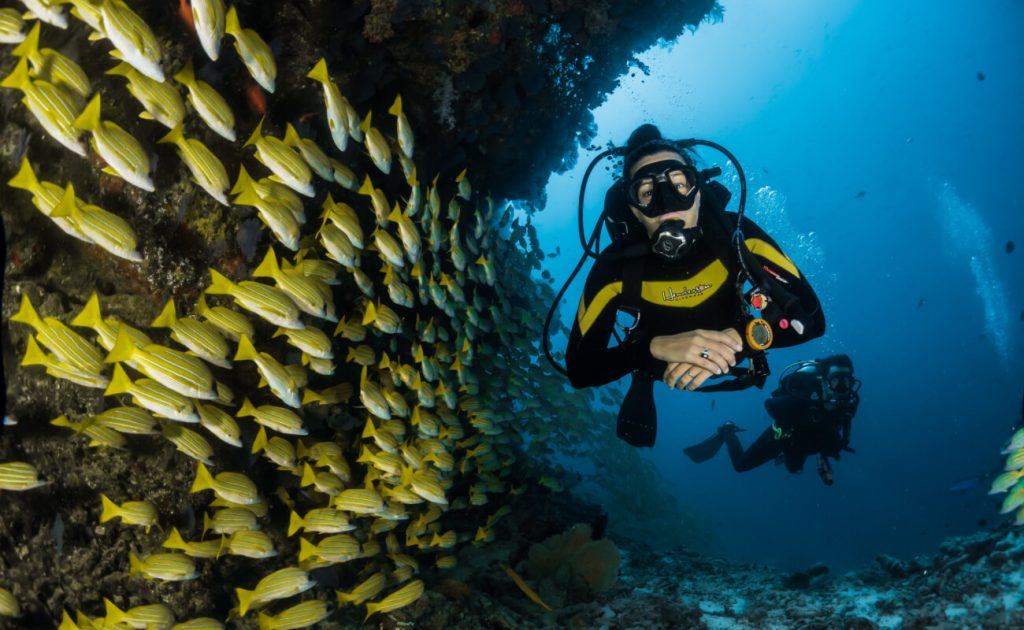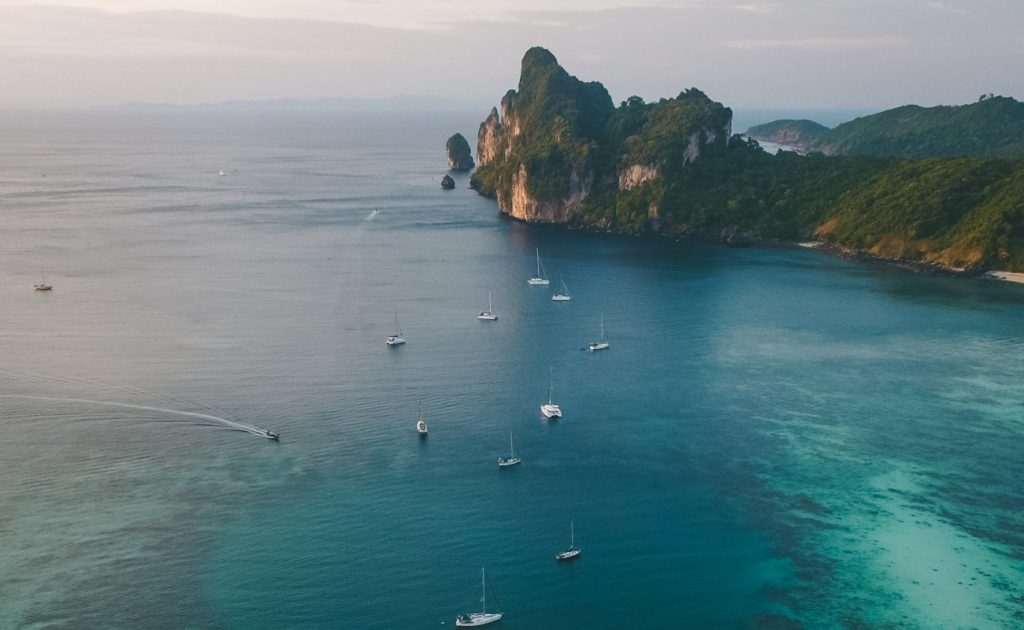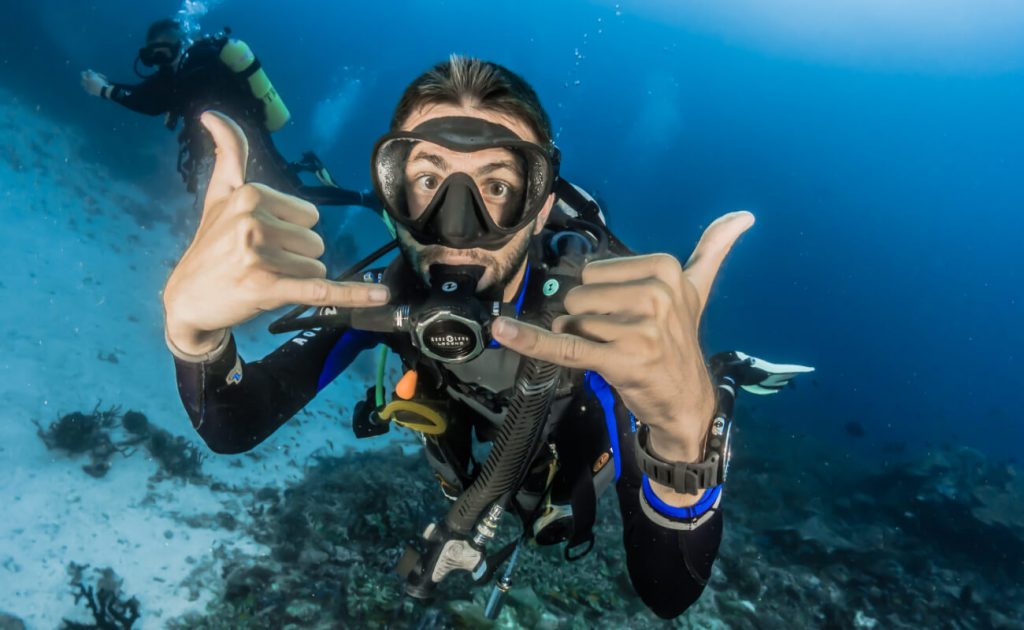Scuba diving is an increasingly popular hobby for people all around the world. While it is a generally safe activity when conducted correctly, it does entail a few risks. Luckily, these dangers are almost always preventable as long as you follow some vital scuba diving safety rules.
Disclaimer: The information offered below is designed for educational purposes only. Do not rely solely on this information; seek professional advice on all matters related to scuba diving safety. If you have any further concerns or questions, consult with your guide, divemaster or diving instructor.
Scuba Diving Safety Before Your Dive
1. Get Certified and Master Skills
Scuba diving involves risks, which is why it requires special training. The instruction uses a curriculum developed by recognized diving agencies; divers learn about the principles of diving and develop skills by diving in both confined and open water environments. The safety-related information is brought in stages, and divers will learn about the specific risks of each diving level they wish to obtain and how to tackle them.
Learning how to use your buddy’s alternate air source, conduct a Controlled Emergency Swimming Ascent (CESA), disconnect your pressure inflator hose, clear your mask, perform CPR, and give emergency oxygen are among the vital scuba diving safety skills you should learn and master.
2. Stay Healthy
One of the most ignored safety checks before a dive is ensuring you’re in a healthy state. So what should divers do for their own safety?
Here are a few things you should and shouldn’t do:
- Don’t drink. Drinking before a dive entails a number of risks, including nitrogen narcosis, heat loss, impaired judgment, and it affects the reaction time, attention span, and visual tracking, among others.
- Don’t smoke. It’s advisable to abstain from smoking at least 12 hours before your dive. If you’re doing multiple dives that day, do not smoke between dives. Smoking before a dive results in reduced tissue oxygenation, causing the body not to function at peak level.
- Workout. When diving, you’re putting your body through intense pressure. Improved physical fitness helps your body carry oxygen and boosts circulation, reducing susceptibility to decompression sickness (DCS). Even working out 24 hours before your dive can help prevent the risk of DCS.
- Get medically assessed. Some medical conditions are not compatible with diving, so it’s recommended to get yourself checked periodically to ensure you’re in top-notch condition. Even a common cold or sinus infection can prevent you from going under.
3. Learn About Your Dive Site(s)
Depending on the place you’re diving in, the scuba diving safety measures differ – from the gear you should bring and use to the hours it’s most safe to dive during. Check the weather and ask the local dive center about the water conditions, currents, visibility, and wildlife you may encounter. It’s also important to learn about the on-site facilities and ensure you’ll have access to emergency equipment.
4. Buy Your Own Gear
If you’re serious about scuba diving and plan to dive often, investing in your own gear is one of those things that contribute to your safety. Your gear will fit just right, you’ll become familiarized with it and you’ll always know how to use it safely, allowing you to focus more on your dive. You may not want to buy your own tank and carry it overseas just yet, but things like wetsuits, dive computers, regulators and the likes are easier to bring along.
5. Double Check Your Gear
Whether you own your gear or rent it, always do a safety check before your dives. Inspect it for wear and tear; look for faulty zippers, cracked buckles, and straps, or frayed areas that could lead to leaks. Your regulator and tank should also get checked regularly for functional issues.
6. Know Your Limits
Divers should always dive within their limits. If you haven’t yet gained the required set of skills for a specific type of dive or if you’re not feeling mentally and physically capable to dive, don’t do it. It’s no shame in canceling a dive or changing the dive site with one you’re more comfortable diving.
Ethical dive centers will not allow you to dive a site that’s beyond your qualification level, but you must also be aware of the importance of sticking to what you know. Your dives should match your training and experience.
7. Bring a Buddy (and Be a Good Buddy)
One of the best scuba diving safety measures is to dive with a partner. All divers should be capable of taking care of themselves, but it sure doesn’t hurt to have another pair of eyes and hands, and an extra regulator in case of an emergency.
There are many situations underwater that can be easily fixed when you work in pairs, but only as long as you are within eyesight of your diving partner.
8. Learn Dive Signals
When you are underwater, talking is obviously not an option so you need another method of communication that will allow you to “talk” to other divers. There are a number of different hand signals you can use, from directional to the important safety signals. It’s imperative both you and the other divers know the safety signals so you can understand each other.
9. Plan Your Dive and Dive Your Plan
Planning your dive is yet another scuba diving safety rule you should follow. Prior to going underwater, you and your diving partner(s) should decide on the maximum depth you will go, the bottom time, and agree on the hand signals, among others.
Planning a dive is something both new and experienced divers learn in diving school. There are plenty of tools you can use to plan your dive, from dive computers and timing devices to a recreational dive planner.
You should listen to briefings from your guide, as they’ll discuss information related to the general dive plan. Once you have a solid plan, you should stick to it and not give in to the temptation of diving deeper or straying from the group.
10. Purchase a Scuba Diving/Travel Insurance
You can never be too sure everything will go according to plan on your diving trip. Going to the hospital in a foreign country can be extremely costly, especially if you’ll ever need to use a decompression chamber. Investing in a good scuba diving insurance or a travel insurance that covers injuries that occur from practicing this sport can save you a lot of money in medical bills.
An interesting fact about insurances: Did you know that an insurance does not cover divers that are not certified or those that are diving to a depth past their certification level?
Scuba Diving Safety During Your Dive
11. Don’t Hold Your Breath
One of the main scuba diving safety rules is to always breathe. Divers are often tempted to hold their breath underwater, but it can be extremely dangerous to do so.
The deeper you go, the higher the water pressure gets, and the volume of the lungs goes down. When you ascend, the lungs expand, and that’s when the air in your lungs become unsafe.
If you hold your breath during ascent, your lungs and the air inside them will expand as the water pressure drops. Because that air has nowhere to escape, it will swell against the walls of the lungs. This can cause tears, lung collapse, air embolism, and puts too much pressure on the heart, which can be fatal.
12. Do Safety Stops
You’d think something containing the word “safety” would be required, right? In fact, some safety stops are optional unless you’re diving deeper than 30 meters (100 feet). However, they’re highly recommended for all dives, including shallower ones.
A safety stop is a 3 to 5 minute stop conducted between 5 to 6 meters (15 to 20 feet) during ascent. These stops allow the absorbed nitrogen to be released from a diver’s body. After completing the safety stop, it’s important to rise slowly to the surface and maintain a speed of no more than 18 meters (60 feet) per minute.
13. Do Decompression Stops
Decompression stops are generally scheduled according to how long and how deep you dive. The deeper a diver goes and the longer they stay underwater, the more decompression stops need to be accomplished.
The reason why decompression stops are considered a requirement is because the greater the depth, the more nitrogen is absorbed by the diver’s body. During ascent, the nitrogen accumulated during the dive returns to the blood in the form of microbubbles and is then rejected by the lungs during expiration. Decompression stops allow for gradual recovery, ensuring these bubbles are eliminated, thus preventing decompression sickness.
14. Don’t Touch the Marine Life
Many of the marine animals you’ll encounter on your dives are fragile creatures that can get hurt by a simple touch. There are also species of fish that secrete mucus as a form of protective barrier against external environments. By touching them, you alter that protection and the fish become vulnerable to contamination.
By keeping your hands to yourself you are also protecting yourself. Corals can be sharp and cause lesions and some animals will bite if you get too close. You may also come across poisonous aquatic creatures that won’t hesitate to use their venom if they feel threatened. Some are extremely dangerous for humans.
15. Clear Your Ears
The most common injury experienced by divers is some form of barotrauma to the ear, meaning injury caused by pressure. It generally occurs when the pressure in the middle ear doesn’t equal to the pressure of the outside environment during descent. The first 4.2 meters (14 feet) are especially riskier because of the rapid change in relative gas volume as the diver descends during the first part of the dive.
You can clear your ears by pinching your nose and blowing gently, a method called the Valsalva Maneuver. Another way to equalize is to use your throat muscles to open the Eustachian tubes to allow higher-pressure air from the throat to enter your middle ears. This is done by swallowing; with every gulp, you’ll hear a “pop” that tells you they’re open.
16. Check Your Gauges Regularly
Checking the pressure gauges is also among the essential scuba diving safety tips you need to know about. It may sound obvious yet it’s easy to forget. You can only remain underwater for as long as you have air in your tank. If you check your pressure gauge and surface with a reasonable reserve of air (at least 50 Bar or 500 PSI) in your tank, it’s unlikely you’ll run out of air.
A good rule of thumb is to designate a third of your air supply for the outward journey, a third for the return journey, and keep the final third as a safety reserve. This is called the rule of thirds.
17. Perfect Your Buoyancy
Maintaining optimal buoyancy is a key scuba diving safety rule. Having proper buoyancy means you’ll ascend and descend at will with little effort. But if you have poor buoyancy skills, you’ll struggle throughout the dive and may even make serious errors that negatively affect gas consumption or cause uncontrolled ascents, among others.
18. Don’t Panic
Panic is among the main causes of diver fatalities. In the grip of a panic attack, it’s hard to think rationally and you can become a danger to yourself and also your diving buddies. Learn to recognize the signs of panic in both yourself and others and practice meditation and breathing techniques. If you ever feel too anxious to continue the dive, signal your buddy and have them help you make a safe ascent.
Before a dive, it’s advisable to practice visualization. Go over the things that might go wrong and learn how to solve them. Being informed and prepared should decrease the risk of panic and help you keep a clear head should problems arise.
19. Bring a Dive Computer
Using a dive computer is one of those essential scuba diving safety measures taken by almost all divers today. It’s also a must if you perform multiple dives within a day. This piece of equipment makes your life easier by performing all the complicated calculations in relation to the time and depth of a dive automatically. Because they’re able to continually re-calculate based on changing data, divers can remain underwater for longer periods of time within reasonably safe limits.
20. Be Aware of Boats
Most recreational dives are boat dives, and even if you don’t come by boat, you’ll still share the waters with other vessels. Boats may not observe your presence, so don’t assume they can see you ascending. This may sound like a pretty obvious scuba diving safety tip, but you should always remain aware of what’s above you, as accidents do happen.
One of the most commonly used tools to signal your presence in the area are surface markers buoys and delayed surface marker buoys (or safety sausage). Another item you can use is the dive flag, which is actually required in some diving locations.
Scuba Diving Safety After Your Dive
21. Don’t Fly Immediately After a Dive
Most organizations agree that it’s important not to board a plane the next 24 hours from your dive. This is especially true for dives requiring decompression stops, while for no-decompression dives you can reduce the time to 18 or even 12 hours, according to Divers Alert Network.
The reason for avoiding flying right after a dive is to avoid increasing your risk of developing decompression sickness. Flying increases this risk because of the decreasing atmospheric pressure during ascent. After your dive, you may still have some microbubbles in your system which could expand during flight.
22. Don’t Zipline
While not exactly as dangerous as flying, going ziplining less than 24 hours after your dive may trigger decompression sickness. If you’re ziplining at a sufficiently high altitude, you may experience the symptoms of DCS. Elevation before a dive, however, should not be an issue, so you can still schedule it during your trip.
23. Don’t Go Mountain Climbing
Mountain climbing is another activity you should avoid after a dive, and this is also due to the change in altitude that can cause DCS. As with ziplining, if you want to include this activity during your trip, best do it before the dive to avoid potential health problems.
24. Don’t Drink (Too Much)
We hate to curb your enthusiasm right after a dive, but one of the general scuba diving safety rules involves alcohol. While you may rightfully want to celebrate your dive with your buddies, you may want to postpone it a bit. Drinking alcohol right after a dive is another factor that may affect your body’s ability to eliminate nitrogen.
Furthermore, dehydration is one of the causes of DCS and as we all know, alcohol contributes to dehydration. Being intoxicated can also mask the symptoms of DCS, preventing you to seek medical attention when needed. Best wait a few hours before drinking any amount of alcohol.
Do you have any other essential scuba diving safety tips worth sharing? Leave us a comment below and tell us how you keep yourself safe during your diving trips.




Oscar Morrison says:
I appreciate the information on how to stay safe if we go diving. My wife and I want to find a place to dive on our vacation next year. We’ll be sure to take the proper safety precautions so we can have a good time together.